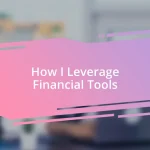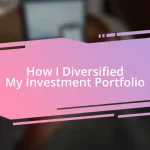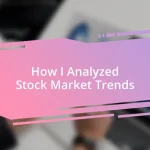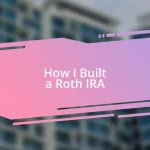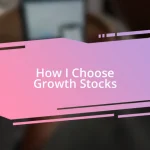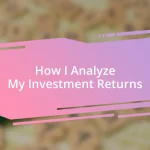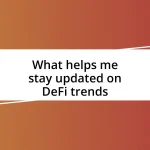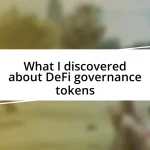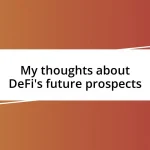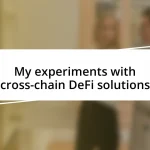Key takeaways:
- Blockchain technology enables secure, transparent transactions and smart contracts, revolutionizing various industries.
- Actively building technical and soft skills, as well as gaining certifications, is essential for a successful career in blockchain.
- Networking within the blockchain community and thorough interview preparation significantly enhance job opportunities and career progression.

Understanding blockchain technology
Blockchain technology fundamentally operates as a decentralized ledger system, recording transactions across multiple computers to ensure transparency and security. I remember grappling with the concept for the first time—how could a digital record be so safe when anyone could access it? The answer lies in cryptographic techniques, which safeguard data and make it incredibly difficult to alter past records without consensus from the network.
As I delved deeper, I found that every block in a blockchain is linked to the previous one, forming a chain that’s immutable. This revelation felt like uncovering a hidden treasure; it was not just about cryptocurrency but an entire ecosystem of potential applications. Can you imagine the implications for industries like finance, supply chain, and healthcare? It opens doors to trustless transactions and can even eliminate intermediaries, enhancing efficiency in ways we haven’t yet fully explored.
Moreover, the concept of smart contracts intrigued me the most. These self-executing contracts with the terms directly written into code symbolize a paradigm shift. I often think about the possibility of automation and reduced litigation costs—what if contracts could execute themselves flawlessly? With blockchain, I realized I wasn’t just learning a new technology; I was witnessing the dawn of a new way of conducting business and interacting in our digital world.

Exploring career opportunities in blockchain
Exploring a career in blockchain feels like stepping into a vibrant and innovative frontier. The moment I realized the vast array of opportunities within this field, I found my excitement growing. From developers creating decentralized applications to legal experts navigating the complex regulatory landscape, the potential career paths are diverse and dynamic.
Here are some of the key roles I encountered on my journey:
- Blockchain Developer: Those who build and maintain blockchain systems. I remember feeling a rush of inspiration when I coded my first smart contract.
- Blockchain Consultant: Professionals who help companies integrate blockchain solutions. The idea of being a bridge between traditional practices and cutting-edge technology fascinated me.
- Product Manager: Overseeing the development of blockchain projects to ensure they meet user needs. I found the blend of technology and user experience particularly appealing.
- Compliance Specialist: Ensuring that blockchain projects adhere to legal standards. It was eye-opening to see how regulations shape innovation in this space.
- Data Analyst: Analyzing blockchain data to derive actionable insights. This role sparked my curiosity about the interpretations behind the numbers.
I can’t help but feel a sense of thrill when I think about how rapidly this landscape is evolving. Each day brings new challenges and innovations, making the blockchain career path not only engaging but also essential for the future of numerous industries.

Building relevant skills for blockchain
Building relevant skills for blockchain is crucial if you want to carve out a niche in this transformative field. There’s a myriad of technical skills that come into play, but I found that nurturing a solid foundation in programming languages like Solidity and Python was paramount. When I first started learning Solidity, I faced challenges with syntax and logic; however, each completed project fueled my motivation further. It was empowering to realize that I was building my own smart contracts, turning abstract knowledge into tangible outcomes.
Beyond technical expertise, soft skills shouldn’t be overlooked. I learned that effective communication is vital, especially when explaining complex blockchain concepts to non-technical stakeholders. I recall presenting a blockchain solution to a team of executives who had minimal tech background. Simplifying my approach allowed me to bridge the gap, demonstrating how blockchain could streamline their operations. This experience highlighted the importance of adaptability and persuasion in driving blockchain initiatives forward.
Lastly, the blockchain landscape evolves rapidly, so continuous learning is essential. I actively sought out webinars and online courses, always staying abreast of new developments. For instance, diving into decentralized finance (DeFi) topics opened my eyes to a whole new world of opportunities. Can you imagine how beneficial it is to have a mindset geared toward perpetual growth? It’s invigorating to think about how much there is to learn.
| Skill Type | Examples |
|---|---|
| Technical Skills | Solidity, Python, Cryptography |
| Soft Skills | Communication, Adaptability, Leadership |
| Continuous Learning | Webinars, Online Courses, Networking |

Gaining certifications in blockchain
Gaining certifications in blockchain was a game changer for me. I remember when I first stumbled upon certifications like the Certified Blockchain Professional (CBP) and how intrigued I felt — it was like opening a door to a treasure trove of knowledge. Pursuing these credentials helped me not just validate my skills but also enhanced my confidence when discussing blockchain concepts with peers and potential employers.
As I navigated through various online platforms, I encountered disruptive courses packed with insights and real-world applications. One particular course on blockchain architecture resonated with me deeply, as it allowed me to build a project that illustrated how blockchain could reshape supply chains. Do you remember the rush of pride that comes from creating something substantial from scratch? I was thrilled to showcase my newfound knowledge in a local tech meetup, making connections that have lasted to this day.
What struck me most was the community surrounding these certifications. Engaging with fellow learners brought a sense of camaraderie that felt empowering. I often found myself in lively discussions, exchanging thoughts on blockchain use cases and the future of technology. Have you ever felt like you were part of something bigger? Choosing to gain these certifications wasn’t just about personal growth; it fostered relationships that enriched my understanding of this ever-evolving field.

Networking within the blockchain community
Engaging with the blockchain community was instrumental in shaping my career path. I remember the thrill of attending my first blockchain conference. Surrounded by passionate individuals, I quickly realized the potential of meaningful connections. Those casual coffee breaks turned into insightful discussions, each one providing a unique perspective on the technology. Have you ever left a conversation feeling inspired to take action? That’s exactly how I felt.
One of the best resources for networking has been online forums and social media groups dedicated to blockchain. I’ve participated in countless Twitter Spaces and Reddit threads where ideas flow freely and opportunities arise unexpectedly. It’s fascinating to witness how supportive the community can be when sharing projects and seeking feedback. I still cherish the moment someone reached out to me after I posted my project seeking advice—it not only improved my work but also led to a long-term collaboration.
Moreover, I made it a point to engage with local blockchain meetups. The first time I presented my project on a decentralized application, I was nervous, but the encouragement from fellow attendees made it worthwhile. Their constructive feedback not only bolstered my confidence but also provided suggestions that I hadn’t considered before. How often do we underestimate the power of face-to-face interactions? Networking in these settings truly fosters a collaborative environment that can ignite new ideas and partnerships within the blockchain ecosystem.

Applying for blockchain jobs
When it came time to apply for blockchain jobs, I felt a mix of excitement and anxiety. Tailoring my resume to highlight relevant projects was essential. I made sure to showcase not only my technical skills but also my problem-solving abilities through real-world examples. Did you ever wonder how to stand out in a crowded job market? I realized that emphasizing the hands-on experience I gained during my certifications was a game-changer.
During interviews, I found that enthusiasm for blockchain technology often resonated with hiring managers. Sharing my passion for the potential of decentralized solutions made my conversations more engaging and personal. I vividly remember one interview where I discussed a specific blockchain implementation I had explored. The spark in the interviewer’s eyes told me that this was what they were looking for—genuine interest and knowledge.
Finally, I can’t stress enough the value of following up after interviews. A simple thank-you note can leave a lasting impression, and it opens the door for further dialogue. I recall following up with a company where I interviewed for a developer role; my message highlighted a point we discussed that intrigued me. That thoughtful touch led to further discussions, proving that a personal connection can make all the difference when applying for blockchain jobs.

Preparing for blockchain interviews
Preparing for blockchain interviews requires more than just knowing the technology. One key aspect I found invaluable was conducting thorough research on the company and its projects beforehand. I remember going into an interview where I had explored their GitHub repositories and understood their recent developments. When I asked insightful questions about their work, the interviewers were genuinely impressed. Have you ever recognized that a little preparation can illuminate your conversation? It can turn a standard interview into a dynamic exchange.
Another important lesson I learned was to brush up on key blockchain concepts and current trends. Before my interviews, I made it a priority to review topics like smart contracts and consensus mechanisms, which allowed me to engage deeply in discussions. I recall an instance when a hiring manager asked about the Ethereum upgrade; my knowledge not only impressed them but also fostered a meaningful dialogue about the future of decentralized platforms. It’s fascinating how being well-versed can lead to mutual excitement during the interview.
Lastly, don’t underestimate the power of soft skills in your preparation. Demonstrating your communication and teamwork abilities can be equally critical in blockchain roles, where collaboration is often key. I distinctly remember a point in an interview where I recounted a challenging situation I faced while working on a blockchain project. Sharing how I navigated setbacks while keeping the team motivated sparked a genuine connection. Can you see how personal stories can illustrate your problem-solving skills and adaptability? Emphasizing these qualities can truly set you apart from other candidates.

